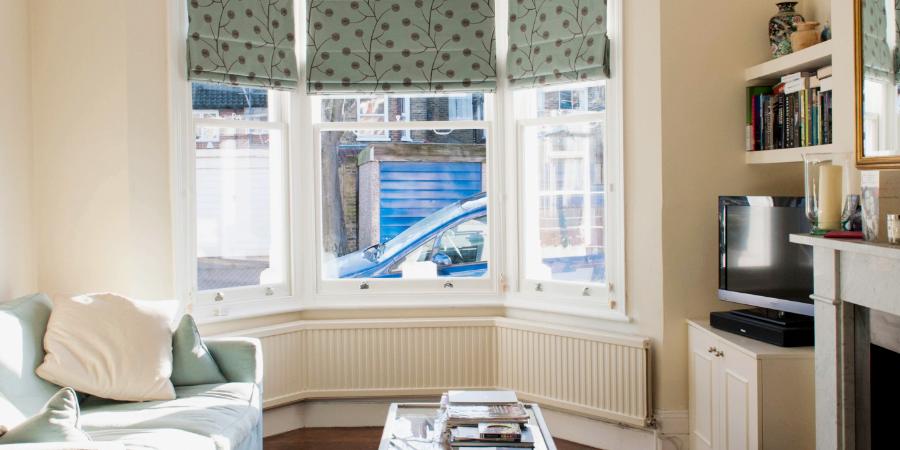In the ever-changing climate of the UK, where sunny spells can swiftly turn to biting wind and rain, windows play a pivotal role in our daily lives. Replacing old windows with new double-glazed wooden sash windows might seem straightforward, but the wide range of options available can make it a complex journey. At Wandsworth Sash Windows, we pride ourselves on simplifying the process for our customers. Here, we answer crucial questions about wooden sash windows to help you decide if you are considering upgrading your sash windows.
-
What Is Double Glazing?
Double glazing, as the name suggests, involves two panes of glass separated by a gap filled with insulating gases like argon or krypton. This design significantly reduces heat loss and improves energy efficiency. The insulating gap acts as a barrier, facilitating the transfer of heat and cold between the inside and outside of your home; this results in a more consistent indoor temperature, reducing the need for excessive heating in the winter and cooling in the summer. Additionally, double glazing can reduce noise pollution, creating a quieter and more comfortable living environment.
-
What’s Wrong With Single-Glazed Sash Windows?
Back when sash windows were first popular, the technology for double glazing didn’t exist, so many original sash windows feature only single-pane glass. While single-pane windows serve their purpose, they have significant downsides. Inefficient single-glazing can lead to substantial energy loss and challenges in maintaining a comfortable indoor temperature; this results in higher energy bills and contributes to environmental concerns. Noise pollution is another issue, as single-pane windows do little to block out external sounds, impacting your well-being and peace of mind. Moreover, poor insulation can lead to dampness, condensation, and cold spots in your home, potentially causing damage and discomfort.
-
Do I Need Planning Permission for Double Glazing?
In most cases, installing double or triple glazing doesn’t require special planning permission. However, listed buildings and conservation areas pose some unique challenges. Listed buildings often have restrictions to preserve their historical and architectural significance, sometimes allowing only like-for-like replacements. Investigating and understanding these restrictions before proceeding with any window replacement work is crucial. Consulting with local planning authorities or heritage organisations can help you navigate these regulations and find solutions that comply with conservation requirements while enhancing your home’s energy efficiency.
-
What Is Triple Glazing?
Triple glazing follows the same principles as double glazing but incorporates three panes of glass instead of two. This design offers even better energy efficiency and noise reduction. The additional pane of glass and insulating gap further enhance the window’s ability to prevent heat transfer and block external noise. While triple glazing comes at a higher cost, it provides superior thermal insulation and soundproofing performance. For homeowners looking for comfort and energy savings, triple glazing is an excellent investment.
-
Is Triple Glazing Better Than Double Glazing?
Triple glazing offers better noise reduction and insulation, making it a great choice if it fits within your budget. The additional pane of glass provides an extra layer of insulation, further reducing heat loss and improving energy efficiency; this can be particularly beneficial in colder climates or areas with high noise levels. However, double glazing is also a worthy upgrade, substantially improving comfort and energy savings. Both options have their merits, and the choice ultimately depends on your specific needs and budget.
-
Should I Choose Triple Glazing or Double Glazing?
Choosing between triple and double glazing depends on your location, needs, and budget. In noise-prone areas, such as near busy roads or airports, triple glazing can provide superior soundproofing and enhance your living environment. However, in some regions, conservation restrictions limit your options, making double glazing more suitable. Double glazing still offers significant improvements over single glazing and may be a more cost-effective solution. Assessing your requirements and consulting with window experts, such as Wandsworth Sash Windows can help you make an informed decision that balances performance, aesthetics, and cost.
-
What Frame Options Are Available?
There are various sash window frame options on the market, however, we work with timber. Timber frames offer a natural appearance, excellent insulation, durability, and eco-friendliness. They are ideal for listed buildings and can be customised with various hardwoods, and factory-sprayed with micro-porous paint. Timber frames provide a classic and authentic look, enhancing the character of your home.
-
How Much Money Can I Save with Double or Triple Glazing?
According to the Energy Saving Trust, energy-efficient sash windows offer significant savings on energy bills. The amount saved depends on the windows’ energy rating and the type of property it is. Homes with older, single-glazed windows can experience substantial reductions in energy consumption by upgrading to double or triple-glazing. These savings offset the initial investment and contribute to a more sustainable and environmentally friendly lifestyle. Additionally, enhanced insulation can increase the overall value of your property and improve its market appeal.
-
What Questions Do You Have?
Even with these answers, we welcome any other questions. Whether you are considering double or triple-glazing your sash windows, or need more details on frame options, energy savings, or planning permissions, our team at Wandsworth Sash Windows is here to help. Feel free to contact us. We aim to provide you with the information and support you need to make the best decision for your home.

